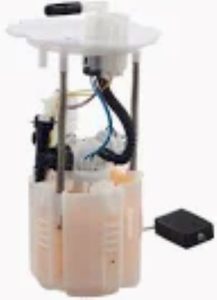A fuel pump system has a number of essential parts that need to work in tandem as they work together transporting gas from the tank to your engine. The fuel pump itself builds up the needed pressure to pump out 70 liters per hour -- typical rate for many cars on the market. Without enough pressure, engine performance suffers, which can result in a loss of horsepower and an increase in fuel consumption.
Electric fuel pumps have since overtaken older mechanical pumps, with a modern electric fuel pump that deliver around 90% efficiency. For example, a good manufacturer such as Bosch offers electric pumps capable of more than 3.5 bar (50 psi), which is the minimum fuel delivery pressure required at high rpm for high performance engines. Usually it will last around 100,000 miles, but that can vary depending on driving conditions and quality of fuel.
Fuel filters play an important role too by ensuring contaminants are not able to get through with the engine. Flow can be reduced by as much as 25% with a completely clogged filter, which may result in engine damage. FiIlter RatingsFilters with even finer pore sizes of approximatley 10 microns are employed to serve high performance engines, in models like the race automobiles.
The injector is engineered to spray fuel in a fine mist so it can properly ignite within the cylinders. Retarding the transverse of the injector, increase 15% high engine performance, adjusting the amount of fuel injected.

The fuel pressure regulator is very important when it comes to keeping the proper constant pressure on the fuel system as modern engines need stable fuel flow in order for them not to have misfire issues. Turbocharged engines have a regulator, that is rock-stable at 60 psi, just because of the boost pressure the air intake is much higher than that.
To have a dependable method for delivering the fuel, however, you need to be sure that your electrical parts receive the power they need…which is obviously provided by your fuel relay and fuse. In some of the worst case scenarios, if these components do ever fail, they can lead to extensive recalls in the industry, as was seen with Ford's F-150 models where the fuel pump dropped dead.
All in all, the whole fuel pumps network is designed to operate under high pressure, adapt to different conditions and always deliver the gas that makes it into the engine as efficient as possible The fuel pump is the heart of this system, so unless you want to get stuck in the middle of nowhere it might be wise to give her some attention now and then.
If you want to learn more about fuel pumps, read for more info: Fuel Pump.